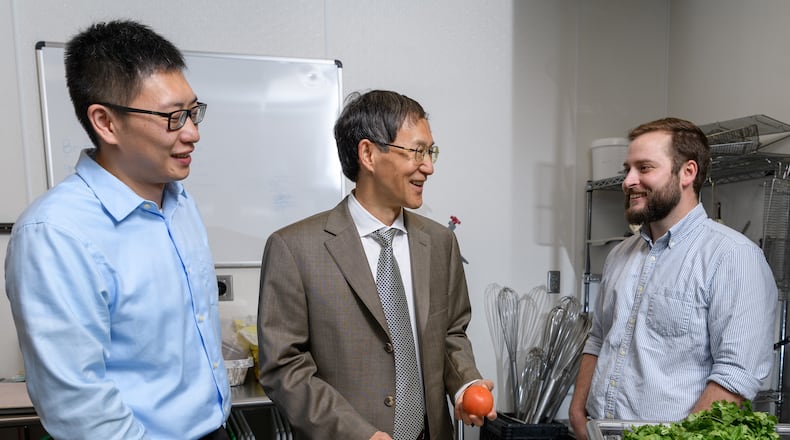Of the billions of gallons of wastewater generated each year in North America, 75% is treated but almost none of it is reused.
A new pilot program at Georgia Tech’s School of Civil and Environmental Engineering is hoping to change that, at least locally.
The program, made possible by a $5 million grant from the USDA (the largest USDA grant to the university to date), will use wastewater from campus to grow lettuce, tomatoes and other fruits and vegetables. It’s an effort to find sustainable methods for food production in urban areas.
“The overarching goal is trying to figure out a way to use wastewater nutrients to grow produce in urban areas so we can decentralize vegetable production,” said Yongsheng Chen, a professor at the school.
Wastewater is water affected by human use, in this case, it is extracted from the Georgia Tech campus sewer system.
Credit: AJC FILE PHOTO
Credit: AJC FILE PHOTO
With water increasingly scarce around the world due to population growth and climate change, researchers say it is just a matter of time before we will have to rely on water that has already been used. At some point, that will likely include wastewater despite some discomfort with the idea of using it to grow food.
In some areas, the practice is already happening, according to Serena Caucci, a researcher with United Nations University, a global think tank and teaching organization backed by the United Nations. "If used properly, wastewater can provide important nutrients for plant growth and act as a replacement for mineral fertilizers. But it should be used for agricultural purposes only after being treated," wrote Caucci in a 2017 report.
About 10% of the world’s food is currently produced using untreated wastewater, notes Caucci, and the main reason is that it is cost free. But using contaminated water to grow corps can cause severe gastrointestinal disease and cancer, particularly in children, elderly and individuals with compromised immune systems, the report said.
>>READ | Researchers hope to reduce water contamination in DeKalb
Even in industrialized countries where technologies for advanced wastewater treatment exist, there are still risks. Emerging pollutants and antibiotic-resistant bacteria can slip past conventional wastewater treatment, said Caucci in the report.
“The major concern is emerging contaminants from the treated wastewater but they are in the surface water anyway,” Chen said.
The water generated by the pilot project will remove all emerging contaminants from wastewater leaving it cleaner than surface water, he said.
The project is currently in the design phase, but once it is up and running in the spring, it will feature an anaerobic membrane bioreactor — a system that uses a membrane to separate solids and liquids in wastewater without the use of oxygen — that will transfer organic matter into a mixture of gasses. Pathogens and contaminants such as E. coli, pharmaceuticals and heavy metals will be stripped away leaving only nutrients such as nitrogen, phosphorus and potassium. The nutrient rich wastewater will then flow into a hydroponic system to grow produce without the use of fertilizer.
Researchers on the project will monitor waste and produce quality, as well as measure contamination levels.
>> RELATED| Fulton County spills 40 million gallons of sewage in rivers, creeks
“We are not doing traditional farming type of work,” Chen said. “We are integrating all types of technology into the project — machine learning, artificial intelligence and other sensor monitoring — so we can not only optimize the production of the produce we are going to grow but also optimize the work.”
The team will compare data from the program to data from traditional agriculture to understand how the system performs on water, energy and nutrient needs.
Chen said the system could be an application that is perfect for developing countries and beyond. “This type of system can make food production more resilient and secure,” Chen said. “That is another advantage to integrating wastewater treatment with urban food production.”
About the Author
Keep Reading
The Latest
Featured




